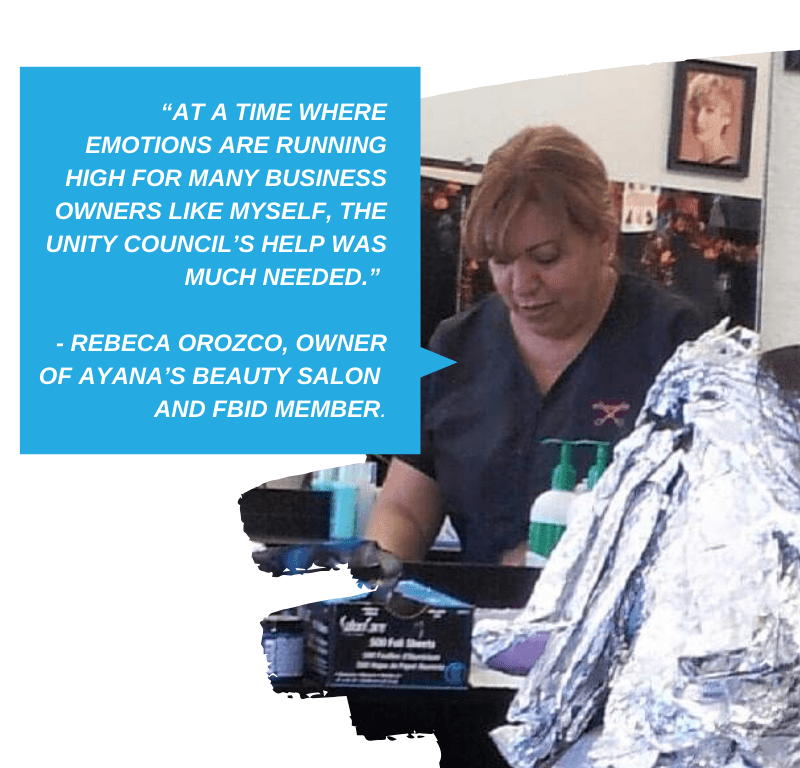
Like many small business owners, Rebeca Orozco has recently spent sleepless nights thinking every day, every hour her store remains closed, increases her chances of falling behind financially. Rebeca, owner of Ayana’s Beauty Salon on Foothill Boulevard, holds back her tears as she stops by the shop to quickly pick up a few items. Since the shelter-in-place began on March 16th as a result of COVID-19, the salon is no longer a place filled with music, great conversations, or the scent of styling products. Instead, she walks into a gloomy room with empty salon chairs and heaps of mail, many of them bills near the entrance.
“My husband is retired and his checks are only $800 a month,” said Rebeca, who is also the breadwinner in her family. “I am worried because we don’t have enough to pay the bills.”
This story is all too familiar for many of the small business owners along Oakland’s Fruitvale neighborhood, who already face various barriers due to income, language, and immigration status. Prior to the pandemic, many were making enough to get by due to the cost of living in Oakland.
“The Fruitvale’s business community is unique and vibrant and yet it is also one of the most economically fragile communities in Oakland for businesses for many complex reasons,” said Tiffany Lacsado, Associate Director of Economic Development at The Unity Council.
Lacsado manages the Fruitvale Business Improvement District (BID), an organization operated by The Unity Council comprised of 370 businesses, many of them are minority and immigrant-owned. Property owners pay a special tax that fund the program to promote clean and safe streets, offer community-building activities and attractions, and build skills for small business owners to support sustainable growth.
When the shelter-in-place was in effect, BID quickly began to reach out to partners on the local, state and federal level to provide emergency resources for their constituents, including how to file for funding, unemployment or additional safety-net services.
“When we looked around at what was going on in our business ecosystem on the local, state and federal levels and what resources and aid were being offered, we realized that we needed to develop a response and recovery plan that understood the unique barriers such as digital divide, language access, foreign-born and/or undocumented owners,” said Lacsado. “Our businesses were facing issues accessing emergency financial assistance so we had to make sure we had all the support our businesses could rely on to navigate these resources and overcome these barriers.”
Rebeca learned through the BID she was eligible to apply for two small business grants: the City of Oakland Small Business Emergency Grant Program and the LISC/Verizon Small Business Recovery Fund. Through the help from BID Program Manager Maria Sanchez and Small Business Improvement Coordinator Regina Moreno Hernandez, she not only received translation and assistance applying to these grants, she was offered additional community resources that best supported her small business.
On April 22nd, Rebeca learned she was awarded a small business grant from the City of Oakland and Working Solutions, a nonprofit Community Development Financial Institution and was in shock that she had different people read the notification, including her son in England to ensure it was not a scam.
“I am beyond happy with the help received from Maria Sanchez and the BID,” said Rebeca. “Their help saved my salon,” says Rebeca.
Rebeca used the funds to pay for rent and utilities owed since March as well as protective equipment for her salon for when she reopens. Rebeca is looking forward now more than ever to reopen the salon and seeing her customers once again. She says, “it feels like a dream but I thank everyone for making it possible to keep my doors open and continue what I love to do.”
